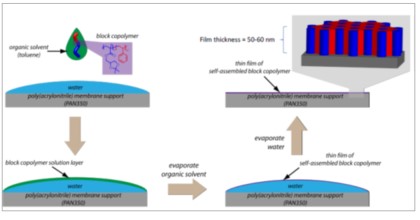Ultrahigh Molecular Weight Block Copolymer Thin Films
Web Published:
10/16/2020
Compositions and methods of making biofouling-resistant, ultrahigh molecular weight polymer thin films applicable to water purification as well as drug delivery.
At present, the utilization of block copolymer (BCP) derived filtration membranes has been limited due to issues and challenges relating to, for example, synthesis, cost, pore orientation, and hydrophobicity, the latter of which makes them prone to (bio)fouling, which, in turn, may cause structural or functional deficiencies.
Provided here are ultrahigh molecular weight (UHMW) BCPs (PS-PSM) that can readily self‐assemble into thin films (20‐200 nm) having a pitch (of individual domains) of 50‐300 nm. The thin films comprising these UHMW BCPs can have various morphologies as well as possess photonic properties. Certain of these UHMW BCPs have been used to prepare ultrathin membranes (<100 nm) that possess a high density (6 x 109 pores/cm2) of uniformly aligned and vertically oriented cylindrical pores (1‐50 nm), and because these membranes are hydrophilic, are resistant to biofouling.

Not only are the UHMW BCPs and the ultrafiltration membranes comprising them resistant to biofouling, but the proprietary methods used to prepare them are amenable to scalable and cost‐effective manufacturing. Further, membranes comprising these BCPs possess a high density of uniform (10-50 nm) pores within an ultrathin selective layer (<100 nm).
- Water purification
- Drug delivery
US Non-Provisional Patent Application 16/610,451 US20200062882A1 filed May 4, 2018.
Prototype demonstration.
Available for licensing or collaboration.
Macromolecules 2016, 49(10), 3733-3738
Patent Information:
| App Type |
Country |
Serial No. |
Patent No. |
Patent Status |
File Date |
Issued Date |
Expire Date |
|